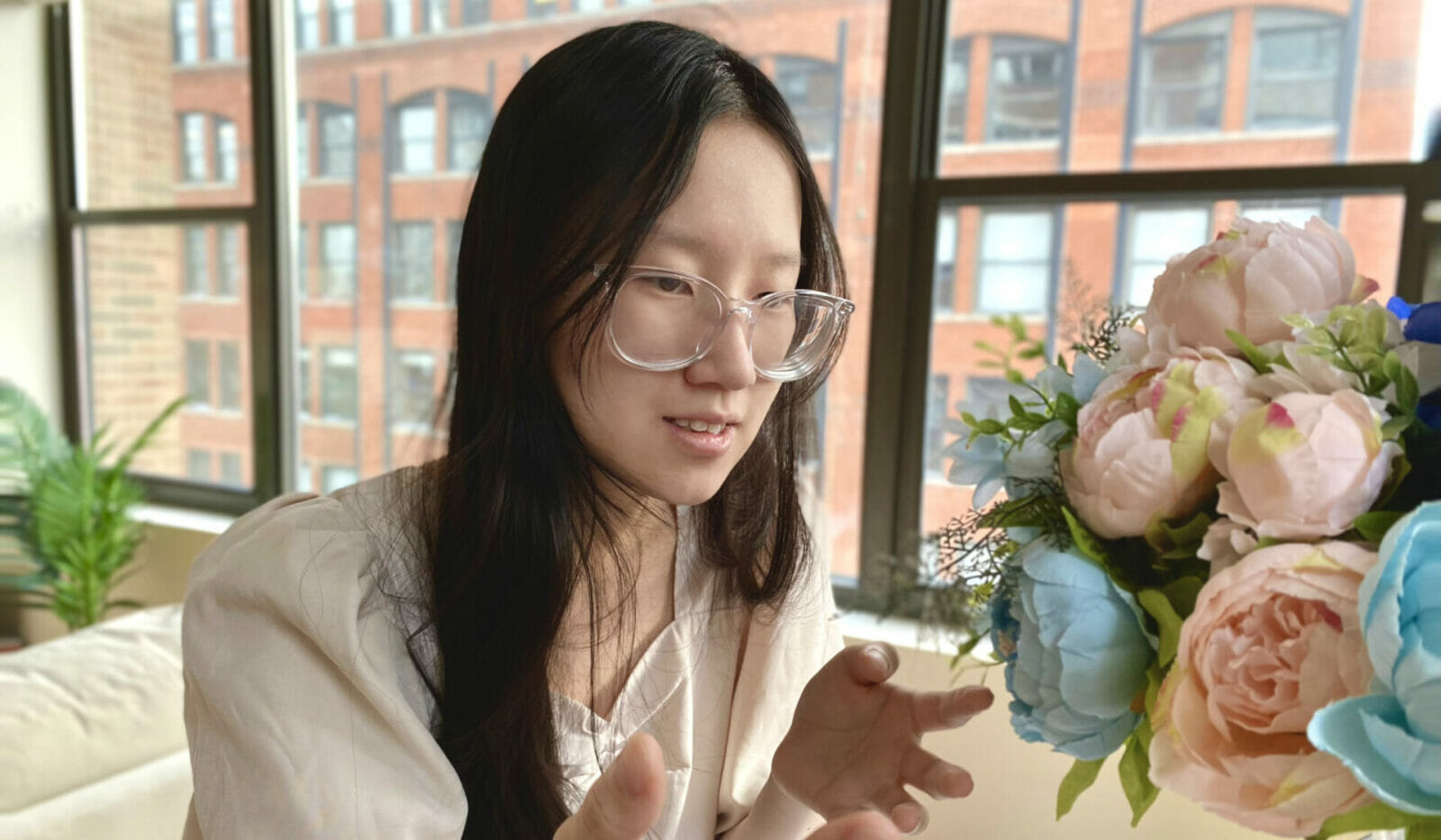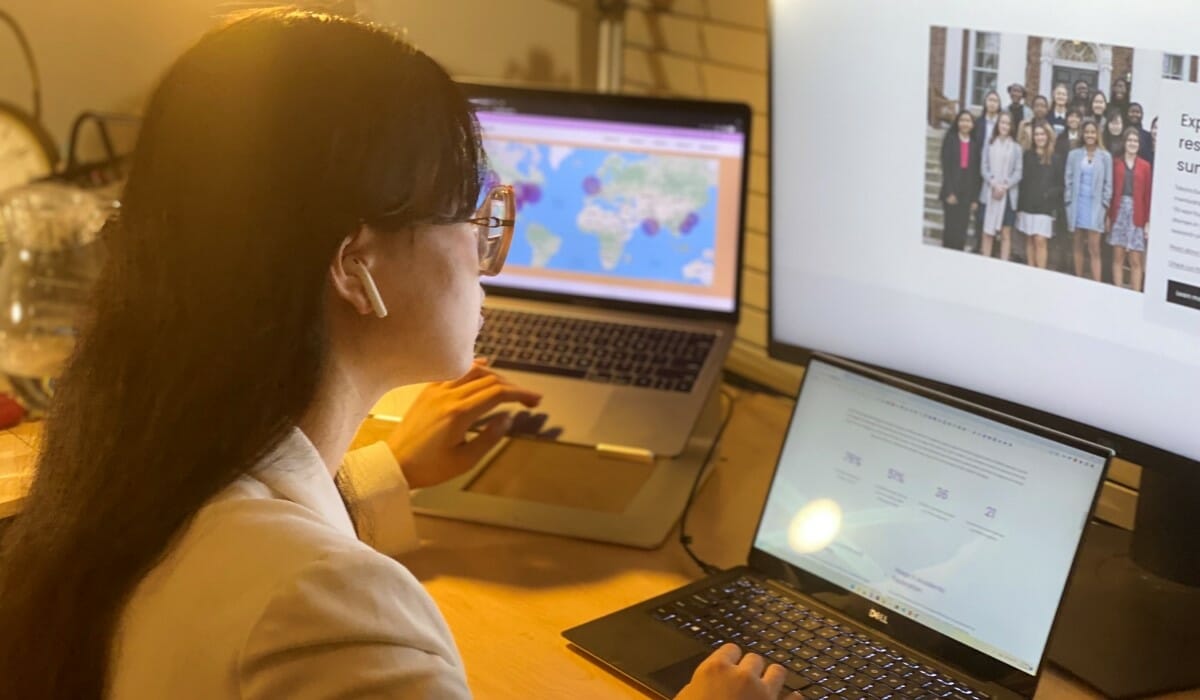Chicago Teen Stands for STEM, Providing Women with Research Opportunities

Meet Daily Point of Light Award honoree Nora Sun. Read her story and nominate an outstanding volunteer or family as a Daily Point of Light.
Nora Sun is deeply passionate about what she does: getting more girls involved in science. Already, the Chicago-based 17-year-old has been named a 2022 Global Teen Leader by Nile Rodgers’ We Are Family Foundation, and her organization’s research competition, ENVISION, has been featured in the Chicago Tribune.
Nora discovered that science research augmented her passion and self-efficacy for science. She built her organization in hopes of sharing her positive research experience and her passion with other girls… and her impact has been profound. Read more about Nora’s work and how she leads with quiet confidence and steady strength.
Describe your volunteer role with your organization.
I’m the founder and executive director of ATHENA By Women In STEM, which I started three years ago when I was 14 years old. My primary volunteer duties include drafting operational documents, building and communicating between various teams within the organization, forging partnerships and overseeing that all the organization’s programs run smoothly.
The under-representation of women in STEM is a widely acknowledged problem; less than 30% of all academic researchers are women, with numbers lower than 10% for some STEM fields such as computer science. The lack of non-male voices in research is detrimental because diverse perspectives are crucial to the progression of science.
What does ATHENA do?
ATHENA By Women In STEM follows a three-step pathway to introduce underserved female students to scientific research.
First, we have outreach and mentorship initiatives, which help students navigate high school, find subjects of interest and gain the confidence they need to pursue STEM. Second, we host virtual workshops and conferences with various scientists to help students gain a better understanding of the research process and research niches. Finally, we host the month-long Talaria Summer Institute research program, where students are paired with mentors (professors from the U.S., Canada and the U.K., as well as postdocs from the U.S.)
During the Talaria Summer Institute, female high school students are connected with these mentors to conduct research, write research papers and then present at the Talaria Conference.
This program has a 15% acceptance rate and over three summers has hosted a total of 400 participants. Talaria is the first research experience for 80% of mentees. And 95% of Talaria mentees report a significant increase in self-confidence following the program.
Finally, ENVISION is a research competition where teen girls write research proposals; each is judged by at least 10 judges from a panel of 300, most of whom are researchers at Ivy League universities. ENVISION has had more than 400 participants and has awarded $1,600.
What’s your favorite type of science?
Biology – specifically, the study of proteins. This is the field I’d like to pursue professionally, as a researcher.

What inspires you to volunteer?
Other people’s love for science inspires me. As someone who’s interested in science myself, it’s very interesting to me to hear other students’ reasons they love science and the unique ways in which they view science – which is often different from how I view it. Those unique views are really beautiful and diverse, which is inspiring to me.
What’s been the most rewarding part of your work?
Meeting people and hearing the ways the programs have impacted them is gratifying, but even being able to establish a connection with people is gratifying in itself. Connecting with others who share the same passion for science is rewarding.
What have you learned through your experiences?
A lesson I’ve learned is that there are many different styles of leadership that can be equally effective. Growing up and consuming media, I often saw ideas of feminism or being a female leader associated with being loud and even a bit masculine.
I don’t possess these qualities. I’m actually quite soft-spoken. But I’ve been able to take advantage of my softer personality and use it to better connect with people who volunteer with my organizations and still be an effective leader, even if I can’t necessarily get everyone’s attention in a room, for instance.
Why do you think it’s important for others to get involved with causes they care about?
It gives you both purpose and gratification to get involved with something you’re passionate about, even if it’s not directly related to your job or source of income.
Are there any future partnerships, programs or events that you are excited about?
Regarding Talaria Summer Institute, this year we’re partnering with a few universities to actually bring the program on campus. So instead of students living in their homes and traveling to and from the research labs, they can actually live on campus for a month like university students, while they conduct their research and complete their mentorships.
What do you want people to learn from your story?
A tip I’d give is if you’d like to start your own initiative or solve a certain problem, do a thorough literature search and research the problem to understand what solutions already exist. This way you can create something unique.
For example, in my area, women in STEM, there are already a lot of initiatives. But after researching the initiatives that already existed, I found a lot of them weren’t actually focused on women in research specifically. They also lacked intersectionality of identities. So this helped me determine what I wanted to focus on with my own initiative.
Research has been described by many women as an intellectually empowering experience. So this fueled my philosophy around building ATHENA, because I really wanted the focus to be on building confidence in the people involved. That’s why research is such a big aspect of our initiatives, because it’s been said to be intellectually empowering.
Do you want to make a difference in your community like Nora? Find local volunteer opportunities.
